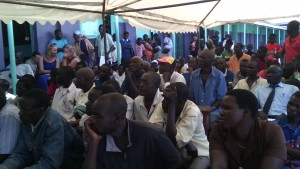This post was written by Lino Owor Ogora, Director, Foundation for Justice and Development Initiatives (FJDI), an NGO based in Gulu District, Uganda, that works with children, youth, women, and communities to promote justice, development, and economic recovery in Northern Uganda.
“Watching the confirmation of charges hearing of Dominic Ongwen has restored our trust in the international community because it is evidence that someone was watching, and that our suffering was not going unnoticed.” Atiya Justine, community member in Lukodi.
January 21, 2016 dawned as another hot dusty day in Lukodi Village, located in Gulu District, Northern Uganda. But this was not going to be like any other ordinary day in Lukodi, because a live screening of an International Criminal Court (ICC) proceeding from The Hague, Netherlands, was going to be conducted in the community.
Dominic Ongwen, an alleged commander of the notorious Lord’s Resistance Army (LRA), is charged with 70 counts of crimes against humanity and war crimes allegedly committed against four camps for internally displaced persons (IDPs) in Northern Uganda. He is accused of leading assaults from 2002 to 2004 that led to the deaths of over 2,000 people and the abduction of 3,000 more. Pre-trial judges at the ICC are currently holding hearings to decide if there is enough evidence for his case to go to trial.
The ICC Field Outreach Unit, in collaboration with the Foundation for Justice and Development Initiatives (FJDI), planned to conduct a live screening of Ongwen’s confirmation of charges hearing. The screenings were to be conducted in nine selected locations across Northern Uganda, including Lukodi.
Lukodi is one of the many villages in Northern Uganda that suffered from brutal LRA attacks. Located 17 Kilometers from Gulu Town, the village was the scene of a horrible massacre that occurred on May 19, 2004. LRA rebels raided the village, looted goods, burnt houses, and killed any civilians they came across. Dominic Ongwen is alleged to have led the attack against Lukodi.
The audience of nearly 1000 community members watched closely as the proceedings opened at the ICC. The judges opened the hearings and Ongwen appeared briefly on the screen—dressed smartly in a suit and tie—drawing scrutiny and comments from the community.
“He has grown fat,” one woman remarked, drawing laughter from the rest. “He is so smart. Life at the ICC must be very nice,” another man remarked, earning more laughter.
Seated on wooden school benches, on a hot scorching day, amidst the sound of chattering women, crying children, and whirring from the public address system, the people of Lukodi watched as the ICC prosecution team laid out its case.
They seemed mesmerized by the ease with which the prosecution lawyer rolled off names of places in Northern Uganda with a western accent. Although they had heard it many times before, the people hung onto the words of the prosecution lawyer as he told the court about the history of the LRA and their hierarchical and organizational structure. The community members watched with fascination as sound clips from intercepted radio communications were played by the prosecutor. Most of them were amused to hear the voices of LRA commanders Joseph Kony and Vincent Otti.
ICC outreach team and FJDI staff provided a summary and explanations of what was transpiring for the benefit of people who could not understand English. Community members were also given an opportunity to ask questions or make comments during a break.
Mr. Atiya Justine, a community member asked, “If Dominic Ongwen is found guilty, who will pay compensation to the people of Uganda? The ICC or the Government of Uganda?”
“Why are the majority of the people in the courtroom white? Don’t we have Ugandans who are qualified to work at the ICC and represent Dominic Ongwen?,” asked Mr. Pekodwong Godwin.
“When were the radio communications by Ongwen intercepted? Was it while he was still serving in the LRA or after leaving the LRA?,” another woman asked.
Ms. Maria Mabinty Kamara, the ICC field outreach coordinator who was present for the viewing, addressed these questions. She explained that the current proceedings at the ICC was a confirmation of charges hearing, and was not meant to determine whether Ongwen was guilty or not. However, she explained, if the case went to trial and Ongwen was found guilty, then the ICC could pay court ordered reparations through the Trust Fund for Victims. She also explained the recruitment policies of the ICC and the fact that many Africans hold top positions in the institution. She also explained that the radio communications by Ongwen had been intercepted while he was still serving in the LRA.
The community members were given another opportunity to ask questions and make comments after the viewing had ended.
“Watching the confirmation of charges hearing of Dominic Ongwen has restored our trust in the international community because it means that someone was watching, and that our suffering was not going unnoticed. I however urge the ICC to improve the lives of people [who] acted as witnesses. The ICC should assist them in any way so that their lives improve. I also request that the proceedings and evidence presented are compiled into a book for our children to read,” said Mr. Atiya Justine.
There being no more questions or comments, the day was closed and the community members departed for their homes. The community viewing in Lukodi will take place for four more days to come.


FOR ME I WAS GUNFIRED AND I SURVIVED NARROWLY SO I WANTED HIM TO BE HUNGED LIKE SADAM HAUSSEN